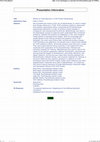Conference Presentations by Nimet Z . Kirişci

Abstract
Alexithymia: Is it a psychological symptom or a personality trait?
Alexithymia is a Gree... more Abstract
Alexithymia: Is it a psychological symptom or a personality trait?
Alexithymia is a Greek term which is used to describe individuals who have diffi culty to defi ne and verbalize their emotions. Studies and clinical observations have shown that alexithymia which was fi rst observed in psychosomatic patients has also been seen on several psychological disorders such as depression, post-traumatic stress disorder, substance abuse and dependence. Nevertheless, recent research indicates that alexithymia is a phenomenon which is also seen in normal population besides clinical context. This situation leads us to ask the question whether alexithymia is a psychological disorder, a symptom, an individual tendency or a personality characteristic. Furthermore, there are some disagreements around whether alexithymia is reversible or irreversible. This work, a historical perspective by considering the concept of alexithymia; Literature light is a clinical concept of alexithmin, or a personal feature mi is to look for the answer to the question. In the framework of this general purpose, The theoretical models explaining the etiology will be reviewed and then the studies related to the alexithymia components will be included.
Key words: Alexithymia, psychosomatic diseases, personality
THE CASE
The woman patient is 80 years old and she has 3 daughters. She was brought to our clin... more THE CASE
The woman patient is 80 years old and she has 3 daughters. She was brought to our clinic by her daughters due to her obsessions that have been going on for a long time and making her daily life difficult. The reasons of her arrival were her obsessions, problems she had because of her search for approval to these obsessions from her husband and daughters, her isolation in her social life due to her compulsions, her inability to be home alone and outside and her need for somebody with her all the time. After an evaluation, she was diagnosed with Obsessive Compulsive Disorder and being scared of being alone.
Papers by Nimet Z . Kirişci

We evaluated the impact of the use of bibliotherapy on client's insight and therapy efficiency in... more We evaluated the impact of the use of bibliotherapy on client's insight and therapy efficiency in TLDP. TLDP combines cognitive, behavioral and systemic approaches within a psychodynamic-interpersonalexperiential framework in order to achieve rooted changes in intrapsychic and interpersonal functioning. Bibliotherapy was used in the therapeutic process to help the client understand their emotional problems, address the problems of adaptation in life, and recognize needs specific to developmental stages. With the knowledge and insight gained in the therapy process and guidance of the TLDP therapist, the client could relieve their wounds and achieve change. TLDP technique was applied for 25 sessions with a client found suitable for TLDP selection criteria. 50-minute sessions were held once a week. They were supervised by Hanna Levenson in the supervision work organized with cooperation of the Psychotherapy Institute and Levenson Institute for Training. Bibliotherapy was used to inform the clients on the psychic apparatus, defense mechanisms, psychosexual and psychosocial stages of development, personality disorders, and object relations. During one-year supervision practice between the Psychotherapy Institute Turkey, and Levenson Institute for Training, it has been observed that cognitive education in addition to TLDP techniques improved client's insight. Audiovisual materials and other supplementary materials were used in bibliotherapy. It is observed that client's psycho-education through bibliotherapy enhanced insight and therapeutic efficient with TLDP clients.











Uploads
Conference Presentations by Nimet Z . Kirişci
Alexithymia: Is it a psychological symptom or a personality trait?
Alexithymia is a Greek term which is used to describe individuals who have diffi culty to defi ne and verbalize their emotions. Studies and clinical observations have shown that alexithymia which was fi rst observed in psychosomatic patients has also been seen on several psychological disorders such as depression, post-traumatic stress disorder, substance abuse and dependence. Nevertheless, recent research indicates that alexithymia is a phenomenon which is also seen in normal population besides clinical context. This situation leads us to ask the question whether alexithymia is a psychological disorder, a symptom, an individual tendency or a personality characteristic. Furthermore, there are some disagreements around whether alexithymia is reversible or irreversible. This work, a historical perspective by considering the concept of alexithymia; Literature light is a clinical concept of alexithmin, or a personal feature mi is to look for the answer to the question. In the framework of this general purpose, The theoretical models explaining the etiology will be reviewed and then the studies related to the alexithymia components will be included.
Key words: Alexithymia, psychosomatic diseases, personality
The woman patient is 80 years old and she has 3 daughters. She was brought to our clinic by her daughters due to her obsessions that have been going on for a long time and making her daily life difficult. The reasons of her arrival were her obsessions, problems she had because of her search for approval to these obsessions from her husband and daughters, her isolation in her social life due to her compulsions, her inability to be home alone and outside and her need for somebody with her all the time. After an evaluation, she was diagnosed with Obsessive Compulsive Disorder and being scared of being alone.
Papers by Nimet Z . Kirişci
Alexithymia: Is it a psychological symptom or a personality trait?
Alexithymia is a Greek term which is used to describe individuals who have diffi culty to defi ne and verbalize their emotions. Studies and clinical observations have shown that alexithymia which was fi rst observed in psychosomatic patients has also been seen on several psychological disorders such as depression, post-traumatic stress disorder, substance abuse and dependence. Nevertheless, recent research indicates that alexithymia is a phenomenon which is also seen in normal population besides clinical context. This situation leads us to ask the question whether alexithymia is a psychological disorder, a symptom, an individual tendency or a personality characteristic. Furthermore, there are some disagreements around whether alexithymia is reversible or irreversible. This work, a historical perspective by considering the concept of alexithymia; Literature light is a clinical concept of alexithmin, or a personal feature mi is to look for the answer to the question. In the framework of this general purpose, The theoretical models explaining the etiology will be reviewed and then the studies related to the alexithymia components will be included.
Key words: Alexithymia, psychosomatic diseases, personality
The woman patient is 80 years old and she has 3 daughters. She was brought to our clinic by her daughters due to her obsessions that have been going on for a long time and making her daily life difficult. The reasons of her arrival were her obsessions, problems she had because of her search for approval to these obsessions from her husband and daughters, her isolation in her social life due to her compulsions, her inability to be home alone and outside and her need for somebody with her all the time. After an evaluation, she was diagnosed with Obsessive Compulsive Disorder and being scared of being alone.